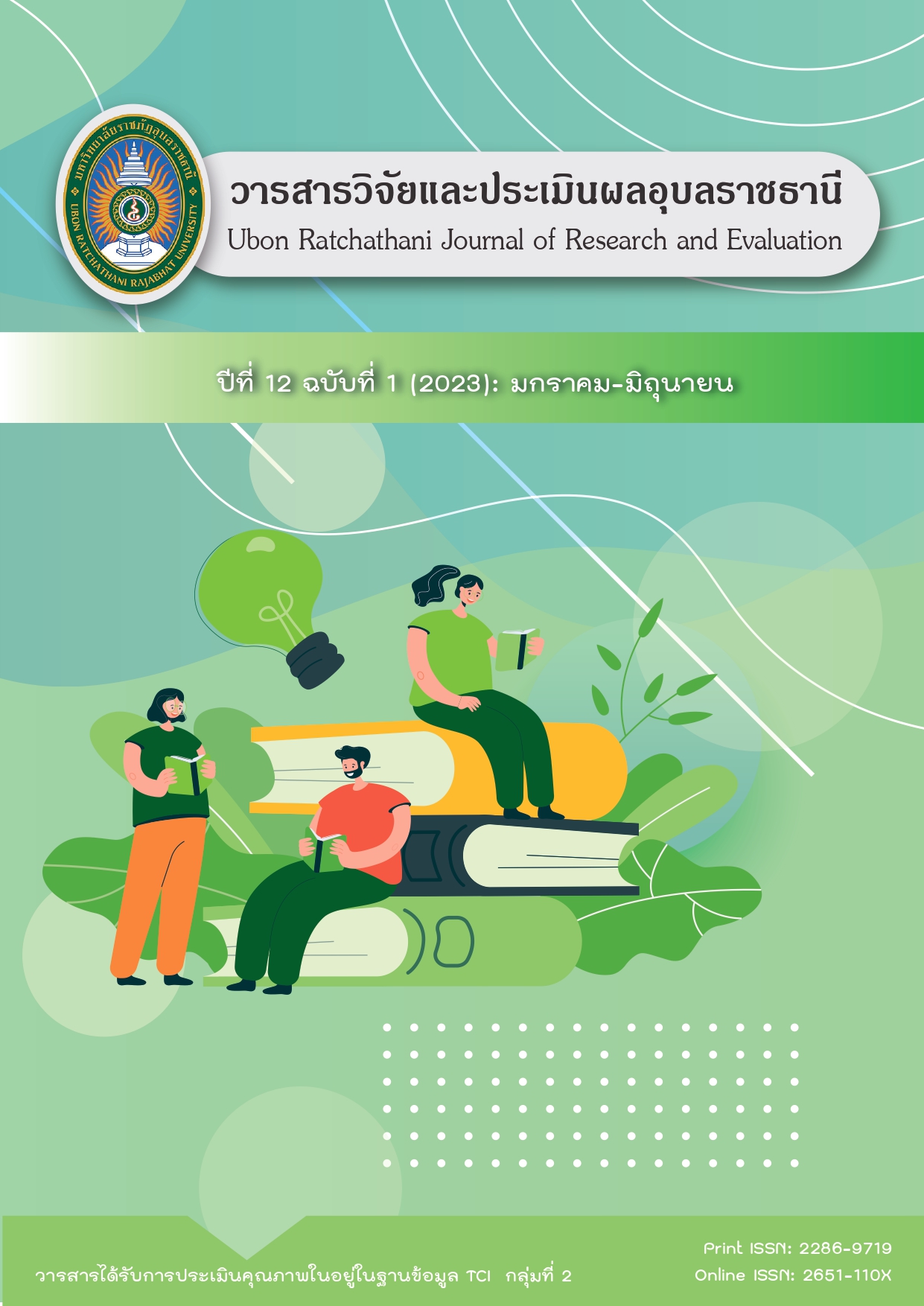Analyze Second-order Confirmatory Factors of Democratic Consciousness Behavior of Grade 6 Students
Keywords:
democratic consciousness behavior, second-order confirmatory factor analysis, elementary school studentAbstract
The purpose of this research were analyze second-order confirmatory factors of democratic consciousness behavior of grade 6 students. Samples, obtained from multistage random sampling, were 1,200 grade 6 students from schools in Roi Et province. Research instrument was a 5 rating scales- questionnaire of democratic consciousness behavior with 75 items which discriminating powers (rxy) ranged from 0.323 to 0.818, and total reliability (α) was 0.910. Data were analyzed using descriptive statistics and second-order confirmatory factor analysis.
The research findings were as follow: Model second-order confirmatory factors of democratic consciousness behavior of grade 6 students consisted of 3 factors with 15 indicators which included factor 1 domains of deference (6 indicators), factor 2 domains of unity (5 indicators), and factor 3 domains of wisdom (4 indicators). It was fit to the empirical data very well (χ2= 55.797, df = 52, p-value = 0.334, CFI = 1.000, TLI = 0.999, RMSEA = 0.008, SRMR = 0.011, and χ2/df = 1.073) which concluded that all factors and indicators in the model were significantly related and supportive.
References
กระทรวงศึกษาธิการ. (2559). ค่านิยมหลักของคนไทย 12 ประการ ตามนโยบายของ คสช. สืบค้นเมื่อ 25 มีนาคม 2562, จาก http://www.moe.go.th/moe/th/news/detail.php?NewsID=41306&Key=news_ research.
Ministry of Education. (2016). The 12 Core Values of Thais, According to the Policy of National Council for Peace and Order (NCPO). Retrieved March 25, 2019, from http://www.moe.go.th/moe/th/news/detail.php?NewsID=41306&Key=news_ research. [in Thai].
คณะกรรมการการเลือกตั้ง, สำนักงาน. (2555). วิถีประชาธิปไตยและการเลือกตั้ง. กรุงเทพฯ: คณะกรรมการการเลือกตั้ง.
Office of the Election Commission of Thailand. (2012). Democracy and Elections. Bangkok: The Election Commission. [in Thai].
คณะจิตวิทยา, จุฬาลงกรณ์มหาวิทยาลัย. (2563). พฤติกรรมประชาธิปไตย. สืบค้นเมื่อ 2 ธันวาคม 2563, จาก https://www.psy.chula.ac.th/th/feature-articles/democratic-behavior.
Faculty Psychology, Chulalongkorn University. (2020). Democratic Behavior. Retrieved December 2, 2020, from https://www.psy.chula.ac.th/th/feature-articles/democratic-behavior. [in Thai].
ปริญญา เทวานฤมิตรกุล. (2555). การศึกษาเพื่อสร้างพลเมือง. กรุงเทพฯ: นานมีบุ๊คส์พับลิเคชั่น.
Thaewanarumitkul, P. (2012). Civic Education. Bangkok: Nanmeebooks publication. [in Thai].
ไพบูลย์ สุวรักษ์. (2549). การวิเคราะห์องค์ประกอบบุคลิกภาพประชาธิปไตยของข้าราชการครูในเขตพื้นที่การศึกษาอุบลราชธานี เขต 3 (วิทยานิพนธ์ครุศาสตรมหาบัณฑิต, สาขาวิชาวิจัยและประเมินผลการศึกษา). มหาวิทยาลัยราชภัฏอุบลราชธานี, อุบลราชธานี.
Suwarak, P. (2006). A Factor Analysis of Democratic Personality of the Teachers in Ubon Ratchathani Educational Service Area Office 3 (Master’s of Education Thesis, Program in Educational Research and Evaluation). Ubon Ratchathani Rajabhat University, Ubon Ratchathani. [in Thai].
วิชัย ตันศิริ. (2557). ศาสตร์การสอนความเป็นนักประชาธิปไตย. กรุงเทพฯ: สถาบันนโยบายศึกษา มูลนิธิส่งเสริมนโยบายการศึกษา.
Tansiri, W. (2014). Pedagogy of the Democrat. Bangkok: Institute of Public Policy Studies, Foundation for the Promotion of Public Policy Studies. [in Thai].
ศศิธร อมรินทร์แสงเพ็ญ. (2554). การวิเคราะห์องค์ประกอบและการพัฒนาลักษณะประชาธิปไตยของเด็กปฐมวัย (ปริญญาการศึกษาดุษฎีบัณฑิต, สาขาวิชาการศึกษาปฐมวัย). มหาวิทยาลัยศรีนครินทรวิโรฒ, กรุงเทพฯ.
Amarinsangpen, S. (2011). A factor analysis and development of democratic characteristics of young children (Doctor of Education Degree in Early Childhood Education). Srinakharinwirot University, Bangkok. [in Thai].
Geiser, C. (2013). Data Analysis with Mplus. NY: The Guilford Press.
Hair, J. F., Black, W. C., Babin, B. J. & Anderson, R. E. (2014). Multivariate Data Analysis (7th ed). NJ: Pearson Education, Inc.
Kelloway, K. E. (2015). Using Mplus for Structural Equation Modeling (2nd ed.). CA: Sage.
Downloads
Published
How to Cite
Issue
Section
License
Copyright (c) 2023 Ubon Ratchathani Journal of Research and Evaluation

This work is licensed under a Creative Commons Attribution-NonCommercial-NoDerivatives 4.0 International License.
1. บทความที่ตีพิมพ์ในวารสารนี้ได้มีการตรวจสอบการลอกเลียนงานวรรณกรรมแล้ว ไม่เกินร้อยละ 25
2. บทความที่ตีพิมพ์ในวารสารนี้เป็นข้อคิดเห็น ข้อค้นพบของผู้เขียนบทความ โดยผู้เขียนบทความต้องเป็นผู้รับผิดชอบต่อผลทางกฎหมายใด ๆ ที่อาจเกิดขึ้นจากบทความนั้น ๆ
3. บทความ ข้อมูล เนื้อหา รูปภาพ ฯลฯ ที่ได้รับการตีพิมพ์ในวารสารวิจัยและประเมินผลอุบลราชธานี ถือเป็นลิขสิทธิ์ของวารสารวิจัยและประเมินผลอุบลราชธานี หากบุคคลหรือหน่วยงานใดต้องการนำทั้งหมดไปเผยแพร่ต่อหรือเพื่อกระทำการใดๆ จะต้องได้รับอนุญาตเป็นลายลักษณ์อักษรจากวารสารวิจัยและประเมินผลอุบลราชธานีก่อนเท่านั้น และจะต้องมีการอ้างอิงวารสารวิจัยและประเมินผลอุบลราชธานี ฉบับนั้น ๆ ด้วย






